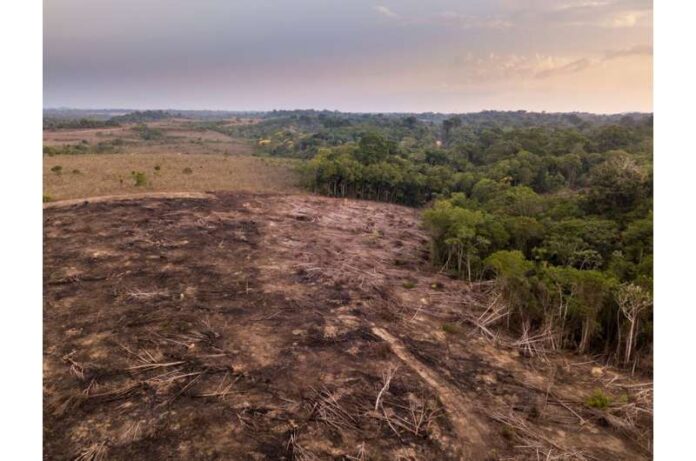Forests throughout the world are shrinking year after year—and Brazil is the epicenter. According to the World Wildlife Fund, more than a quarter of the Amazon rainforest will be devoid of trees by 2030 if cutting continues at the same speed.
If nothing is done to stop it, an estimated 40% of this unique forest will be razed by 2050.
Beyond the material and environmental consequences, this deforestation also threatens human rights, including the rights of marginalized communities to life, physical integrity, a reasonable quality of life and dignity. Brazil is one of the most worrying cases in this regard.
As a Ph.D. student in political science, my research interests include climate justice, the energy transition, the green economy and international environmental politics.
Chainsaw massacre
Article 25 of the United Nations Declaration on the Rights of Indigenous Peoples rules that these communities fully possess the “the right to maintain and strengthen their distinctive spiritual relationship with their traditionally owned or otherwise occupied and used lands, territories, waters and coastal seas and other resources.”
This article is not being respected by the Brazilian government in the Amazon.
Although the country had pledged to significantly reduce deforestation and limit clear-cutting to 3,925 square kilometers, data from Human Rights Watch shows that chainsaws have razed nearly 13,000 square kilometers of tropical forests, making communities of Indigenous peoples even more vulnerable.
The rate of deforestation in these territories increased by 34% between 2018 and 2019, despite Brazil’s commitment in 2009 to reduce it by 80%. This has led to the forced displacement of communities over hundreds of kilometers, as well as major health problems and a loss of reference points. According to Human Rights Watch, nearly 13,235 square kilometers of the Amazon rainforest was clear cut between August 2020 and July 2021, an 22% increase, compared to the same period in the previous year.
This coincides with Jair Bolsonaro’s accession to power. In the month of January 2022 alone, 430 square kilometers of tropical forest was destroyed, five times more than in January 2021.
Threats and assassinations
Multiple abuses have been documented in Brazil since the beginning of colonization, including the illegal encroachment of the Brazilian state on Indigenous territories. Under Bolsonaro, the number of criminal networks contributing to the deforestation of the Amazon has multiplied. Organized crime views the large timber and agriculture industries as opportunities to move and launder money. The groups illegally exploit forest land, then hide drugs in timber shipments destined for Europe or Asia.
Experts qualify this illegal activity as “narco-deforestation.” Numerous illegal gold and mineral extraction sites are also operating in the Amazon, and the companies running them often make threats to the Munduruku that live there.
People and activists who have protested the ongoing deforestation have been threatened, harassed and killed. In 2019, the NGO Global Witness recorded 24 deaths of environmental activists and land defenders, almost all occurring in the Amazon. This puts Brazil in third place among the countries with the highest number of deaths of environmental defenders, after Colombia and the Philippines.
There are reminders of this in the news. Bruno Araujo Pereira, a defender of environmental and Indigenous rights, and British journalist Dom Phillips have been missing since June 5, in an area called the Javari Valley, which has a reputation of being “lawless.”
According to a local organization, the two had received death threats shortly before disappearing. Brazilian police first said search teams had discovered their belongings and later that bodies were spotted in the area of their disappearance. Police reported on June 15 they had found human remains while searching for the pair and that a fisherman who had fought with the pair had confessed to their killing.
The number of deaths of people involved in environmental and territorial defense may be greatly underestimated, as data are not available and transparent for all countries.
Women and children, the main victims of deforestation
A recent United Nations report reveals a strong correlation between worsening climate change and deteriorating human rights around the world.
Deforestation disproportionately affects Indigenous communities, especially women and children. It increases the pressure already placed on women to feed their children and families, while limiting their access to essential goods, including medicine.
Indeed, the health of these communities depends on access to natural medicinal products found in biodiversity. The Amazon is a major reservoir of substances used in the manufacture of several pharmaceutical products available on the South American continent.
Nearly 80% of the population in developing countries relies on natural medicinal products for their primary health care. In the majority of communities, it is also women who are responsible for cultivating the land and providing transportation and water treatment.
Children are equally at risk. For example, a study conducted in sub-Saharan African countries shows a link between the loss of forest cover and the deterioration of health conditions of the youngest. Malnutrition, caused by reduced availability of fruits, vegetables and nuts, can affect children’s growth. The exposure to smoke from the multiple fires in the Amazon is also likely to cause respiratory problems and even more serious conditions in children.
More farming, more deforestation
Deforestation in Brazil offers a preview of the impact that climate change will have on human rights, both in Latin America and elsewhere in the world. In addition, due to the war in Ukraine, Brazil is looking to fill the food gap on world markets with crops such as wheat and grain.
Brazil’s contribution is appreciated by countries such as Sudan, Pakistan and Haiti, which are among those most affected by the food crisis. But increased production may dangerously accelerate deforestation and human rights abuses can be expected to increase.
One thing is certain, one of the lungs of our planet is seriously ill and time is running out.
Provided by The Conversation.

